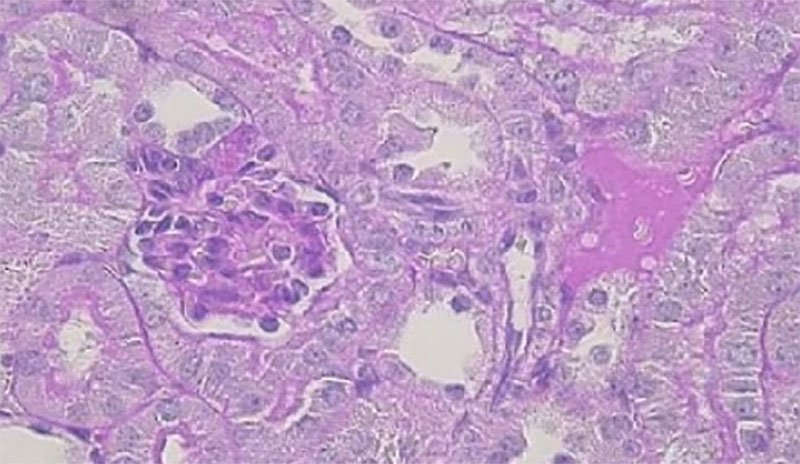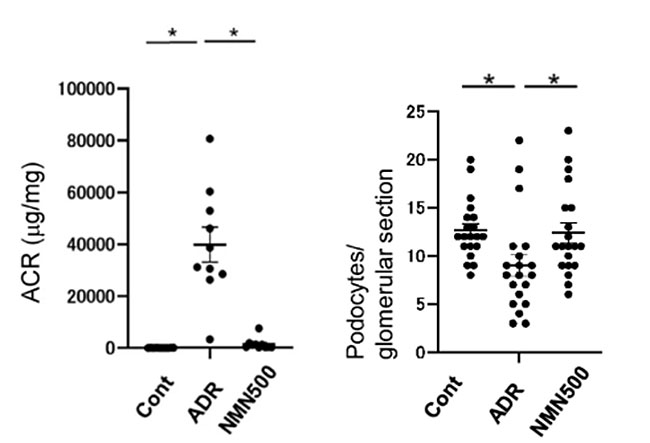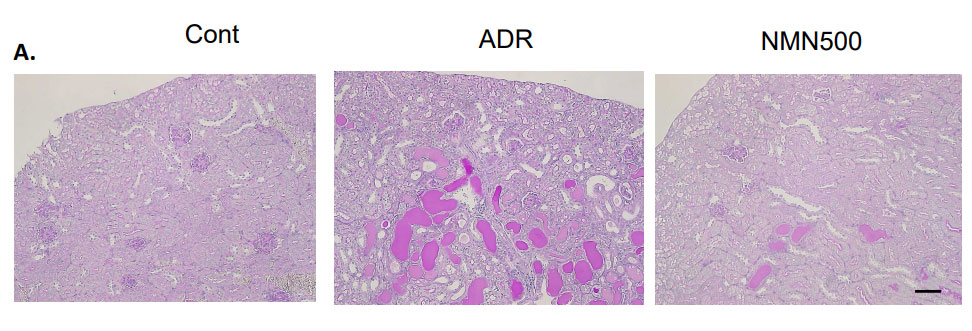Use of NMN supplements was shown to activate Sirtuin-1, one of the body’s self repair enzymes, to repair kidney damage and restore kidney function in mice. (1)
Kidney damage accumulates with age
As we age, we accumulate kidney scarring and tissue hardening, which can impede the kidneys ability to filter proteins in the blood and leading to a condition called glomerulosclerosis. If the condition is severe enough, kidney dialysis or a kidney transplant may be required, so looking for ways to slow this progression are needed.

NMN shown to reverse kidney damage
Scientists from Tokushima University in Japan found that NMN reduced kidney damage for a related kidney disease called focal segmental glomerulosclerosis, which shares a similar pathology to age-related glomerulosclerosis. They found that NMN restored podocyte cells essential for kidney waste filtration.
“NMN treatment was associated with 0.20-fold lower death rates”
“In the present study, the administration of NMN ameliorated kidney damage”
By boosting NAD+ levels, they also found that sirt1 levels increased, decreasing the enzymes associated with kidney tissue damage. This was the first evidence that waste filtration cells were restored by NMN.
“These unfavorable changes were ameliorated by NMN, even after the termination of the treatment, thereby suggesting that Sirt1 reactivation halts the aggravation of the molecular changes… via its long-lasting epigenetic effects.”

It’s important to keep in mind that per the study, NMN was administered in a large dose, delivered by IP. It’s quite possible that oral delivery of NMN may not work quite the same way.
NMN was shown to reduce the amount of proteins in the urine, leading scientists to claim that NMN can actually improve kidney function by restoring waste-filtering podocytes.
Durable improvement long after supplementation over
The improvement in kidney function proved to be durable and long lasting, which was an important finding. NMN supplementation for two weeks was enough to restore and maintain NAD+ and Sirt1 levels, protecting the kidneys from FSGS two weeks after the termination of the treatment in mice.
“We observed long-term effects of the dynamics of NAD+ metabolites after the treatment, suggesting legacy effects by the reactivation of Sirt1.”
“This effect was sustained for 28 days even after the termination of the short-term NMN intervention.”
“Thus indicating that the effects of this treatment protocol were continuous.”
NMN restored low Sirtuin-1 levels in kidneys
In previous studies, it has been shown that adequate levels of Sirtuin-1 is associated with a longer lifespan. Likewise, low levels of Sirtuin-1 is associated with age-related diseases like glomerulosclerosis.
When NMN was given to mice, it increased levels of Sirtuin-1 in the kidneys back to normal. NMN also rescued the expression levels of Sirt6, another extremely important self-repair enzyme, as well as Nampt, and Nmnat1. Kidney tissue preservation was also observed after treatment with NMN.
“NMN maintained the NAD+ levels in the kidneys of the ADR-treated mice and altered the expression levels of Sirt1, Nampt, and Nmnat1.”
“These findings indicate NMN treatment increases both Sirt1 and Nampt levels via a positive feedback mechanism”

This is the first study to show how NMN affects kidney health in aged mice, as well as restoring kidney waste filtration cells which improved their function. Use of NMN could have implications for the treatment of those on kidney dialysis or who are waiting for a kidney transplant.
References:
